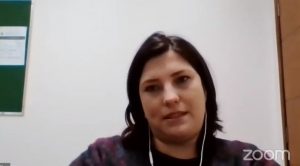Traceability showcases the quality of exported products
Having tools to tell the story of a product since its production until it arrives at its destination is a plus for companies intending to export. In webinar hosted by the Arab Chamber on Wednesday (1), specialists explained how end-to-end traceability helps showing the quality of the product to the consumer.
Traceability is an essential tool to show the quality and safety of products and services in the foreign market. The importance of this tool for companies aiming to compete when going international was pointed out by Rita Froes (pictured above), Business Development executive at Intertek Brazil, a branch of the British multinational assurance, inspection, product testing and certification company, and Nilson Gasconi, Business executive at Brazilian Automation Association (GS1 Brasil), during webinar realized in 01/07/2020. The online event ‘Tools for Global Competitiveness’ was hosted by the Arab Brazilian Chamber of Commerce and attended by some 700 people from Brazil and elsewhere.
A história por trás dos produtos é, para Gasconi, um diferencial para que o consumidor escolha o seu produto entre tantas opções nas gôndolas. “Em segurança dos alimentos, por exemplo, seja ele carne, frutas e verduras, como vou ter segurança? Quando contar a história do meu produto, e ela tem que ser verdadeira”, pontuou.

Telling the story of a product to the consumer through traceable information is a plus that makes the company more competitive, Gasconi says
The story behind the product, Gasconi says, stands out for the consumer when he is choosing a product among so many options. “In food safety, for example, whether it’s meat, fruits and vegetables, how am I going to be sure? By telling the story of my product, and it must be a real story,” he pointed out.
Gasconi believes that making a product traceable gives the company an opportunity to store its data from the beginning to the destination. “Traceability is a process. It can be done on paper, but it’s more agile when automatized. Technology came to make things easier, so that the company can quickly respond to its partner and to the consumer that demands traceability,” he said about the information access, which makes the quality of the product more visible in every stage.
But what is seen as quality? “It’s a subjective concept because people have different expectations,” Froes said. The specialist stressed two widespread models to define quality. One aims at meeting the technical specifications of the product, while the other, most modern, aims at meeting the client’s expectations and includes the product safety more effectively. “In addition to meeting the technical issues, the product must be safe, delivered on time and have a fair price. When we go international, how will we assure that? The logistics, the quantity? In this respect, these services must be audited, so that the information can be gathered and recorded,” she explained, point out that product certification and tools such as barcodes make this more palpable.

Biesek, of Arbaza, raised a question
According to Gasconi, the barcode, for example, is a resource used 6 billion times a day across the world. However, the executive explains that it is not enough to use the tools without paying attention to the good practices. “I must have a database, and this information must have quality. We have the process automation issue. Sustainability is on the agenda and will continue to be because we must have this concern with the environment where the company is located. Visibility, and here I stress the competitiveness issue: the company must make its process visible and transparent to have security across the entire chain,” he stresses.
Alana Biesek, foreign trade manager at Arbaza, also participated in the online event and asked the lecturers about what it takes to start implementing traceability. Froes stressed that the first step is designing your process. “Seeing which information is more relevant and the raw material used. If you will export to some countries, identify what are the legal restrictions, see that different religions specify what foods can or cannot be consumed,” he exemplified. Gasconi pointed out that it is also necessary to identify how to better map out that product, whether by using a barcode or other tool.

Rubens Hannun opened the online event
Arab Chamber president Rubens Hannun believes that adding value to products includes making the consumer aware of the entire work that this good involved. “Understanding the entire production and distribution chain until it arrives at the hands of the consumer,” he said. Hannun added that this value added to the product also includes the technology and quality it carries.
The online conference was moderated by Daniella Leite, commercial manager at Arab Chamber, who stressed the importance of the discussion to give companies information that boost Arab-Brazil trade. “We are here to help you and bring relevant content, training, with our internationalization consultancy services and new business department, to help you seek out opportunities,” Leite pointed out.

Daniella Leite moderated the talks
Speakers at the event also included Diego Bonaldo Coelho, professor at at the Superior School of Advertising and Marketing (ESPM-SP) and Institute of Management Foundation (FIA-SP) and PhD in Administration from the School of Economics, Administration and Accounting of the University of São Paulo (FEA-USP). Speaking from the United Arab Emirates was Vishal Pandey, director at Glasgow Consulting, a survey and business consulting firm. Asking questions was Emad Elbagouri, of Qatar Meat. Simultaneous interpretation into Portuguese and English was available, and this was the ninth webinar hosted by the entity since the beginning of the pandemic.
Latest news
Halal food market growth and size forecast to 2035 Oman strengthens its National Halal System to boost export competitiveness SIILHalal is recognised by MUIS as an international Halal certification body Oman International Trade Exhibition 2026 enters the global Halal market agenda Which is the most visited Muslim city in the world?+55 (49) 3311.8588
Chapecó – Santa Catarina - CEP:89.802-420

